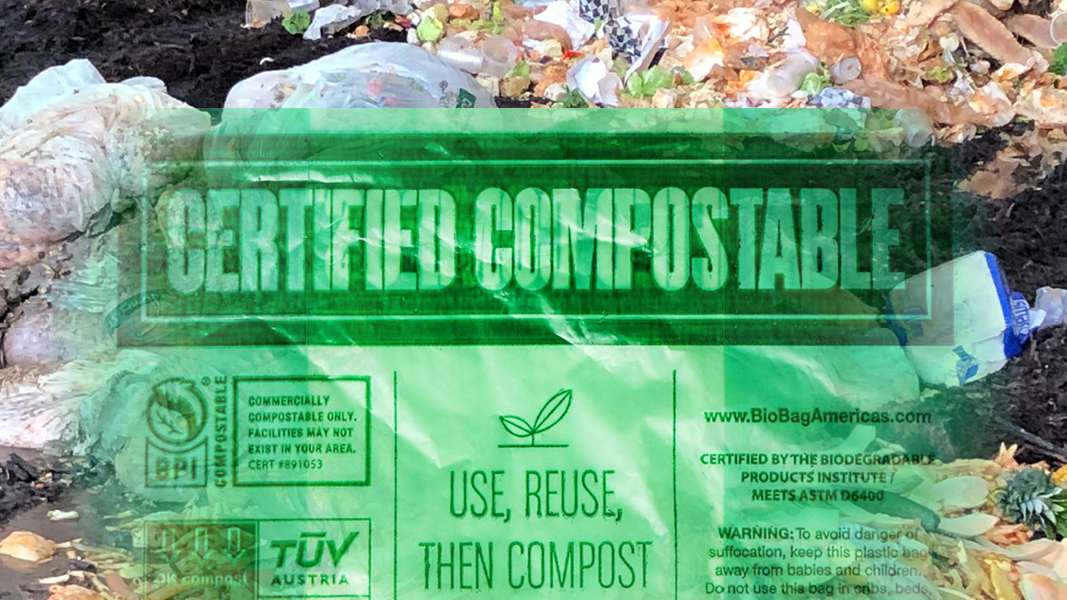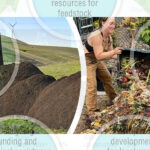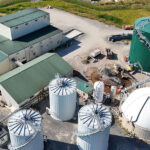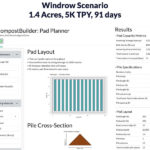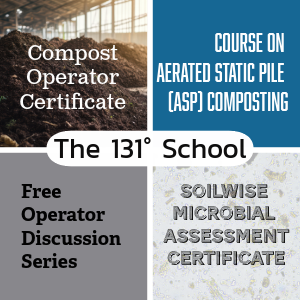Top: Photos by Nora Goldstein and courtesy BioBag
Under California’s AB 1201 law, products labeled “compostable” or “home compostable” are required to be allowed as an agricultural organic input under the U.S. Department of Agriculture’s National Organic Program (NOP) by January 1, 2026. Currently, the NOP does not allow compostable synthetic substances as an agricultural organic input. The law primarily impacts compostable bioplastics products. The Biodegradable Products Institute (BPI) sent a letter in December 2024 to CalRecycle, the agency implementing the AB 1201 law, requesting an extension to the January 2026 deadline for five years. In mid-June, CalRecycle responded to BPI’s request, and granted an extension until June 30, 2027, based on “recent and anticipated activities” of the National Organic Standards Board (NOSB), the advisory board to the NOP. At the NOSB’s spring 2025 meeting, the Crops Subcommittee announced that it was continuing information gathering related to allowance of compostable synthetic substances to inform whether the NOSB should do so (see explanation below).
States the letter to BPI from CalRecycle: “CalRecycle anticipates that the NOSB Crops Subcommittee will publish a proposal related to the allowability of synthetic substances in advance of the NOSB’s fall 2025 meeting (October 22 – 24, 2025), at which the NOSB will vote on that proposal. If the proposal is approved, the NOSB will then submit to the NOP a corresponding recommendation to initiate rulemaking. Although the NOSB continues its work toward recommending changes that would affect the allowability of synthetic substances, there is no reasonable possibility that such process and subsequent formal rulemaking will conclude before January 1, 2026. As a result, the NOP requirement under [AB 1201] PRC section 42357(g)(1)(B) will take effect on that date despite the requirement’s ultimate scope remaining unsettled. That fluid status of stakeholders’ legal obligations would present a significant risk of market disruption and exacerbate consumers’ confusion over what types of products are compostable. Accordingly, CalRecycle is granting a two-year extension [that] … applies to products that contain synthetic substances that otherwise satisfy all requirements for lawfully being labeled ‘compostable,’ including the requirement that products meet an ASTM standard specification pursuant to section 42357(a)(1).”
Before that date, continues the letter, “CalRecycle will evaluate whether to renew exemptions for products that would become compliant pursuant to regulations then under consideration. CalRecycle may determine regulations to be under consideration if there is a pending NOSB rulemaking recommendation to the NOP, the NOP has decided to initiate rulemaking but has not yet done so, or the rulemaking process is underway. A renewed extension shall continue while such regulations remain under consideration but shall not extend beyond January 1, 2031.”
The NOSB’s spring 2025 meeting referenced in CalRecycle’s letter to BPI grew out of a petition that BPI submitted to USDA in August 2023, asking the NOP to engage in rulemaking to update the compost regulations in order to create a narrow allowance for certain “compostable” synthetic substances to be included as compost feedstocks without adding these substances to the National List of synthetic substances allowed in organic crop production. The petition proposes allowing substances that meet compostability specifications (ASTM D6400-21, D6868-21, or D8410-21) to be considered allowed “compost feedstocks” in compost used on organic farms. The NOSB unanimously passed a proposal at its fall 2024 meeting recommending amendments to the organic regulations that would confirm that synthetic compost feedstocks should be reviewed and approved for inclusion on the National List at 7 CFR 205.601(c) and aligns time and temperature requirements to compost industry standards.
At its spring 2025 meeting, NOSB considered a formal proposal that confirms the need for all allowed synthetic compost feedstocks to be added to the National List through a two-third majority vote of the Board, followed by notice and comment rulemaking by USDA, according to a summary of the Spring 2025 meeting. “This proposal is designed to convey clarity to the NOP regarding NOSB’s views on how synthetic compost feedstocks should be considered and allowed in compost used in organic crop production,” states the summary. “In light of the BPI petition and NOSB’s role in reviewing the suitability of compostable polymers for their inclusion in the National List as compost feedstocks, the Crops Subcommittee (CS) is moving forward with information gathering in order to inform the potential National List addition motion at a future meeting. The CS ordered a Technical Report of resins and formulated products that meet ASTM D6400-21, D6868-21, or D8410-21 standards in order to inform the evaluation of whether these substances’ chemical properties align with the tenants of organic production. NOSB is also engaging with organic stakeholders about composting as a driver of change towards sustainability, diverting food waste from the landfill and into composting operations, the role compostable polymers and other synthetic compost feedstocks play in meeting these waste reduction goals, and reducing polyethylene plastic and other contamination in compost currently used on organic farms.”


